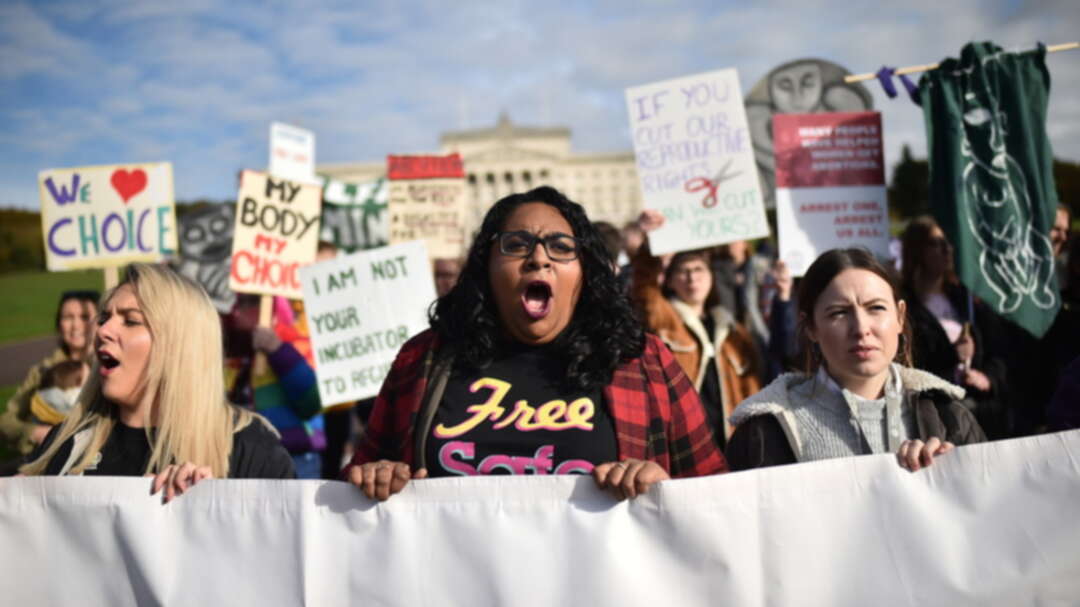-
UK govt directs Northern Irish to implement full abortion services by end of March 2022

The RT reported that Westminster has directed the Northern Irish authorities to implement full abortion services by the end of next March, after the region failed to do so despite a 2019 referendum that decriminalised the termination of pregnancy.
The news agency said that On Thursday, the UK Secretary for Northern Ireland, Brandon Lewis, issued a formal direction to Stormont’s Department of Health, calling on it to implement full abortion services for women no later than by the end of March 2022.
Lewis had said he had “no choice” but to use special measures to start the process of improving the standard and accessibility of abortion services in Northern Ireland.
Abortion was decriminalised in the region in October 2019, following a referendum on the issue, with termination becoming legal in March 2020. Despite the changes in law, Lewis noted that women were still unable to access abortions safely in the country, over a year and a half later, however.
The secretary of state said it was his “legal and moral obligation” to ensure that access to abortion services was as straightforward and accessible as elsewhere in the UK.
Lewis used special powers on Thursday to issue the direction Abortion (Northern Ireland) Regulations 2021. The statutory instrument was passed to ensure the Northern Irish government complies with the law.
While he acknowledged that the pandemic may have slowed down the implementation of abortion services in Northern Ireland, Lewis nevertheless said he remained “extremely disappointed” at the slow pace of change and lack of dialogue on the issue with the region’s Health Department.
There was a significant decrease in women travelling from Northern Ireland to England and Wales for an abortion in 2021, according to UK government data.
Only some 371 made the journey for the purposes of an abortion in comparison to 1,014 in 2019. While the abortion law has taken effect in Northern Ireland, some medical practices refuse to carry out terminations after 10 weeks, however, resulting in women still having to travel abroad if they don’t wish to continue with a pregnancy at a later stage.
A spokesperson for a pro-choice Northern Irish organization ‘Alliance for Choice’ praised the intervention, saying in a statement: “Finally, long overdue abortion services can take their place within healthcare in Northern Ireland.”
“We remain hopeful that people will no longer have to endure the degradation of forced travel to England or navigating a precarious and limited service,” they added.
Conservative politicians of the Democratic Unionist Party, on the other hand, did not rejoice in Lewis’ move. Carla Lockhart, a DUP Member of Parliament in Westminster, called for the legislation that decriminalised terminations to be repealed, posting on Twitter that “abortion harms the voiceless, the most vulnerable in our society.”
Northern Ireland was one of the last countries in Europe with a ban on abortion. Gibraltar, a British overseas territory on the tip of southern Spain, recently voted to make abortion legal up to 12 weeks of pregnancy.
Andorra and Malta still have strict abortion laws, where it is illegal for women to terminate pregnancies even if the mother’s life is at risk.
Source: RT
Image source: Getty-RT
You May Also Like
Popular Posts
Caricature
BENEFIT Sponsors Gulf Uni...
- April 17, 2025
BENEFIT, the Kingdom’s innovator and leading company in Fintech and electronic financial transactions service, has announced its sponsorship of the “Innovation and Sustainable Technology Solutions Competition (GU - IST Solutions), hosted by Gulf University at its main campus.
This strategic sponsorship reflects BENEFIT’s active role in advancing technological innovation and fostering sustainable solutions to future challenges. It also seeks to empower Bahraini youth by enhancing their skills, capabilities, and competitiveness in innovation and solution development—contributing meaningfully to the broader goals of sustainable development across all sectors.
As part of BENEFIT’s active involvement in the competition, the company has announced that Hanan Abdulla Hasan, Senior Manager of Public Relations and Communication, will serve on the competition’s supervisory committee. Her upcoming participation reflects BENEFIT’s forward-looking commitment to championing academic and professional excellence.
Commenting on the occasion, Hanan Abdulla Hasan, Senior Manager of Public Relations and Communication at BENEFIT, said, “We are privileged to support this pioneering initiative, which aligns seamlessly with BENEFIT’s enduring commitment to fostering innovation and nurturing the potential of Bahrain’s youth. Our participation is rooted in a deep sense of social responsibility and a firm belief in the pivotal role of innovation in shaping a sustainable future. Through such platforms, we seek to empower the next generation with the knowledge, skills, and foresight required to develop impactful solutions that address future challenges, in line with the United Nations Sustainable Development Goals 2030.”
Dr. Aseel Al Ayash Dean of the College of Engineering in Gulf University commented, “We extend our sincere gratitude to BENEFIT for their generous sponsorship and support of the Innovation and Sustainable Technology Solutions Competition. This contribution plays an instrumental role in helping us achieve the strategic goals of this initiative, namely, cultivating a culture of innovation and sustainability, encouraging efforts that address the imperatives of sustainable development, and enhancing the practical and professional capabilities of our students and participants.”
The event will bring together a diverse spectrum of participants, including secondary school students, university undergraduates, engineers, industry professionals, entrepreneurs, academic researchers, and subject matter experts representing a wide range of disciplines.
The competition seeks to inspire participants to develop and present innovative, sustainable technologies aimed at addressing pressing environmental, social, and economic challenges. It encourages the formulation of business models that integrate advanced technological solutions with core principles of sustainability. Moreover, it serves as a platform for emerging leaders, entrepreneurs, and innovators to contribute to the advancement of the Sustainable Development Goals, promote the ethos of responsible technology, and demonstrate its transformative potential across various sectors.
Attendees will have the opportunity to view a series of project presentations submitted by participants, covering diverse areas such as eco-friendly product design, smart and sustainable innovations, renewable energy technologies, water conservation and management, waste minimisation and recycling, green architectural solutions, and sustainable transportation systems. Outstanding projects will be formally recognised and awarded at the conclusion of the event.
opinion
Report
ads
Newsletter
Subscribe to our mailing list to get the new updates!






















